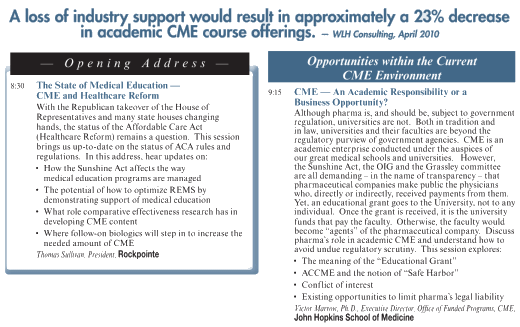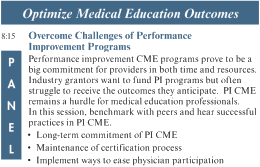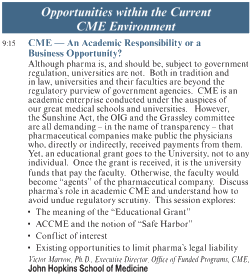"Medical Education Forum"? Or a Dying Industry’s Last Gasp?
The Carlat Psychiatry blog
January 5, 2011I just received the email below because I’m a member of a CME industry group, most of whose members depend on industry funding for their existence. It’s an invitation to a meeting in Philadelphia where stakeholders in commercial CME will try to figure out how to stem the hemorrhage of money out of their ethically sketchy industry…
Medical Education Forum:
Improve Outcomes Through Collaboration to Maximize the Quality of Patient CareThe state of medical education is ever changing and evolving. The pharmaceutical industry is continuously scrutinized for supporting CME. Recent reports on the Sunshine Act regarding payments to physicians, as well as other negative attention and public confusion about the purpose of medical education, are leading to a decrease in perceived value. With limited budgets and declining internal support, it is critical for industry grantors and CME providers to do everything, within regulations, to ensure the most appropriate and effective educational designs and outcomes. For providers, the expectations of industry grantors can be overwhelming without the appropriate staff and financial support. Providers struggle to execute and fulfill outcome assessments that demonstrate, at a minimum, a knowledge or competence change for learners that will positively affect patient care. For industry grantors and CME providers, the need for a common understanding of best practices in educational design is essential to ensure CME programs demonstrate positive outcomes that improve the quality of patient care. That is why CBI’s Medical Education Forum is indispensable to medical education professionals. Hear about regulatory updates, innovative information channels, strategies to measure change in HCP behavior and methods for improved reporting and communication of meaningful outcomes. This forum provides a platform for the exchange of information and open dialogue surrounding the challenges and opportunities in medical education. Please join us March 21-22, 2011 in Philadelphia to learn from and interact with thought leaders in medical education. The seasoned speaking faculty includes perspectives from Abbott, Acorda Therapeutics, Celgene, CE Outcomes, Cephalon, Covidien, DIME, Endo Pharmaceuticals, Genentech, John Hopkins School of Medicine, Med-IQ, MedscapeCME, Medtronic, Merck & Co, National Foundation for Infectious Disease, New Jersey Academy of Family Physicians, Omnia Education, Pfizer, Prova Education, Rockpointe and the University of Pennsylvania School of Medicine…

There’s a page flipping graphic that leads to the conference brochure and schedule. It’s not the kind of thing most of us read, but it’s actually worth the time. I found it horrifying – all the strategizing to keep PHARMA’s foot in the CME door. I guess their assumption is that the industry funding is so much a part of CME that the game will continue to be played on the same field no matter what. They’re trying to learn to play better, seeing that there’s such a growing outcry about their not so subtle use of CME for advertising. Here are a few clips from the brochure:

They’re obviously not too excited about the Affordable Care Act for one thing [I’ll bet the lobbying money is staggering]. The Universities are in the act too, along with PHARMA and the CME Providers. I particularly liked that banner at the top. It’s supposed to worry us. I see it as no great loss. There will just be 23% less empty seats in the auditorium. I also have to wonder why "how to avoid undue regulatory scrutiny" and "Existing opportunities to limit pharma’s legal liability" are being discussed by someone from John Hopkins Medical School.
I really appreciate Carlat’s publishing this letter. I don’t think I realized how much of an industry all of this had become – how many players there were. I think the notion of Continuing Medical Education is reasonable, keeping Doctors from getting rusty or out-of-date. But it has really become something a whole lot more than that, an industry in its own right. And it’s an industry entangled with another industry [PHARMA] so tightly that they’re indistinguishable. I’m not sure the framers of the concept would even recognize what it has become.
 When I woke up this morning, the brochure for the CME conference in this post was still on my screen, so I shared a cup of coffee with it. There were a few more tidbits that caught my eye. I was talking about jargon, and I hit an example that’s a new one. In a previous life, I learned that impact is a verb that doesn’t mean have a wreck with; and that network is a verb that means something like talk to; but I’ve never heard benchmark used as a verb before. I tried to figure out its meaning from the context of the session. They seem to be using Performance Improvement [PI] CME to describe programs where Doctors actually learn something. Apparently struggle to receive the outcomes they anticipate means that Continuing Medical Education programs that actually educate Doctors are hard to sell to PHARMA, who want to use them to advertise their products. I can sure see how that is a problem. From that, I conclude that benchmark with peers has something to do with finding out how other people sell refrigerators to eskimos. How’d I do?
When I woke up this morning, the brochure for the CME conference in this post was still on my screen, so I shared a cup of coffee with it. There were a few more tidbits that caught my eye. I was talking about jargon, and I hit an example that’s a new one. In a previous life, I learned that impact is a verb that doesn’t mean have a wreck with; and that network is a verb that means something like talk to; but I’ve never heard benchmark used as a verb before. I tried to figure out its meaning from the context of the session. They seem to be using Performance Improvement [PI] CME to describe programs where Doctors actually learn something. Apparently struggle to receive the outcomes they anticipate means that Continuing Medical Education programs that actually educate Doctors are hard to sell to PHARMA, who want to use them to advertise their products. I can sure see how that is a problem. From that, I conclude that benchmark with peers has something to do with finding out how other people sell refrigerators to eskimos. How’d I do?

These two sessions were pretty interesting. On the left, they take up the problem that people are complaining about PHARMA directing the content of CME presentations. I think this session is about understanding why that bothers people, how it can get you in trouble, and then thinking up creative new ways to continue to let it happen. The one on the right is a challenge, but I believe I figured it out. It’s about how CME Providers can teach low level PHARMA people to sell refrigerators to their eskimo bosses.
I just can’t talk about this without being sarcastic. I tried, but I couldn’t make it work. There’s not a session at this conference that actually gets at the problem – how to fund Continuing Medical Education if PHARMA is removed from the equation altogether because of the obviously irreconcilable conflict of interest.  The guy from John Hopkins seemed to come the closest to the real issue with CME: An Academic Responsibility or a Business Opportunity? Why not both? Somebody pays tuition to Medical Schools to pay them to teach students to be Doctors – the student, the State, some Foundation giving a scholarship. What’s so different about CME? We’d balk at drug companies paying medical students way through school. We’d ask "In turn for what?" If Doctors have to take time off from work and pay tuition for CME, they [we] are going to pass the cost on to patients. PHARMA is already doing that – in spades! Patients would get a lot better deal from us than from the Pharmaceutical Industry. That’s guaranteed.
The guy from John Hopkins seemed to come the closest to the real issue with CME: An Academic Responsibility or a Business Opportunity? Why not both? Somebody pays tuition to Medical Schools to pay them to teach students to be Doctors – the student, the State, some Foundation giving a scholarship. What’s so different about CME? We’d balk at drug companies paying medical students way through school. We’d ask "In turn for what?" If Doctors have to take time off from work and pay tuition for CME, they [we] are going to pass the cost on to patients. PHARMA is already doing that – in spades! Patients would get a lot better deal from us than from the Pharmaceutical Industry. That’s guaranteed.
I’ve got another idea. How about letting excellence in teaching [including CME] count towards tenure in Medical Schools alongside research? A ton of the research in academia is done to meet tenure requirements. I’d guess that research undertaken with that motive isn’t exactly Nobel Prize material. To my mind, ACADEMIC doesn’t mean just discovering new stuff. It means synthesizing what’s known and presenting it to people who don’t know it in a useful way. I’m getting into my own story here, but I got tenure in a good University without publishing a paper. It wasn’t my doing. I had just put together a ton of educational materials and taught a lot, and they wanted me to keep on doing that. I was too rebellious, I guess, to make up something just to meet a requirement. I was already too busy. People in the college raised holy hell that the Medical School did that [give me tenure]. That wasn’t my business. Another possibility would be to create a "teaching faculty" tract that isn’t a second class citizenship in the Academy.
Thanks for this thoughtful post. Requiem for a Racket is a great header. Even the talk proposed for the guy from Johns Hopkins looks just like a tutorial in money laundering.
Here are some further thoughts in the form of case studies over at Health Care Renewal.
http://hcrenewal.blogspot.com/2008/01/variations-on-theme-of-sleaze.html
http://hcrenewal.blogspot.com/2008/06/medscapes-cme-ethics.html
http://hcrenewal.blogspot.com/2008/06/medscapes-cme-ethics-part-ii.html
http://hcrenewal.blogspot.com/2009/10/nemeroff-seroquel-and-accme.html
http://hcrenewal.blogspot.com/2010/10/thats-education.html
Great stuff up there. I’m a rookie…